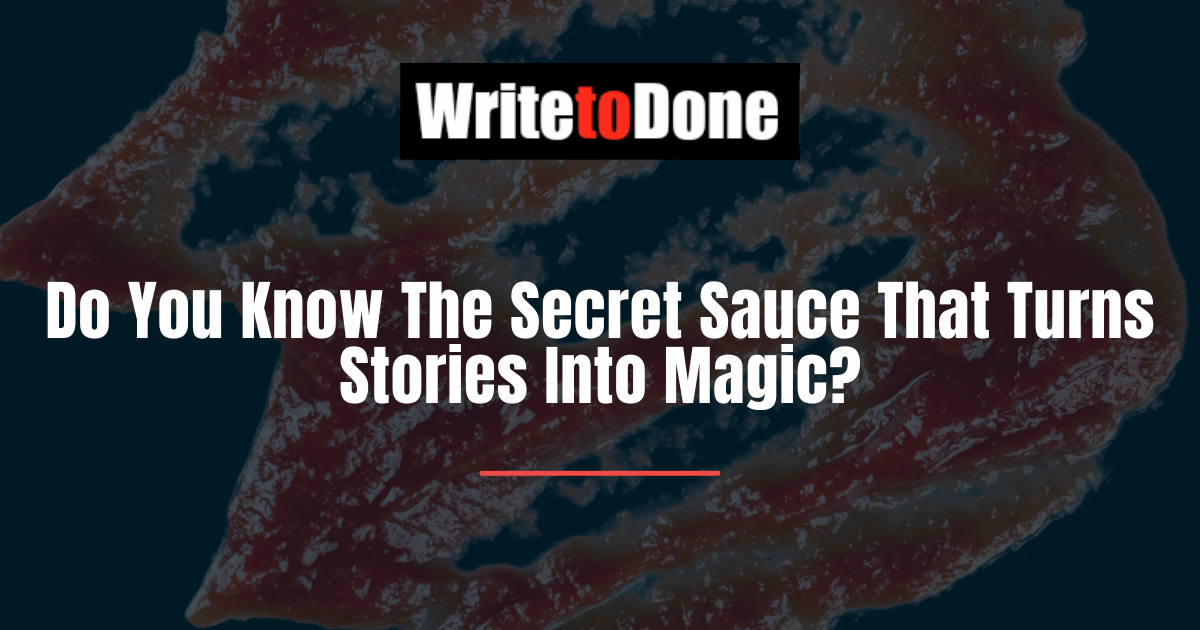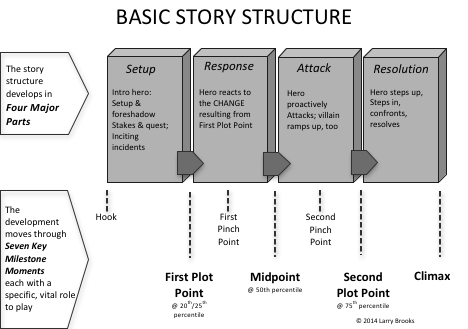Let me tell you a story.
Once there was a writer who had a dream.
To live, work and thrive by telling stories that made people smile, swoon and weep.
He was pretty decent at it too, sailing through school on a knack for essays and last-minute term papers that fooled faculty into giving him a generous grade.
After graduating, he wrote his way into a series of suit-and-tie jobs doing newsletters and assorted copy work that never really rang his creative bell.
On nights and weekends, however, he wrote novels and screenplays.
He wrote, and he read everything he could about how to tell stories.
But after finishing six novels, he’d failed to crack the code that would get him published. The feedback was pretty much the same: nice writing, but the story was either too familiar or a little lacking. What it lacked was never specified.
Something about the dream had eluded him. He could never define what it was.
Apparently it was a secret, because nobody in the publishing business was talking.
All he heard was the usual blah-blah about character development and the avoidance of adjectives, but never much on how to differentiate a great story from an average one. The confusion was compounded by the fact that many famous writers were publishing what seemed average stories at best.
No, they weren’t better than he was when it came to cobbling together sparkling sentences and paragraphs. But they certainly knew something he didn’t.
Meanwhile there was always another brochure to write and a speech to polish, so he had enough to eat, even as his dream went into a reality-induced coma.
But he was starving creatively.
Then one day…
… at work with a writer wearing a tie – behind closed doors they referred to themselves as hacks – in a conference room, pounding out the script for yet another corporate training video, he heard the words that would change everything.
This other guy was older and much more worldly – he had traveled, studying storytelling all around the planet. He was one of the been-around-the-block types who had dipped his toes into the entertainment biz until it cut out his heart and threw it off the CAA building in Los Angeles.
What the crusty old hack said that day, referring to the printer sales video they were writing, was this: “The trouble here is that there’s no story in it. There’s no drama. No heart either. Because there’s no conflict.”
Our frustrated young writer looked up, frozen with the recent memory of yet another rejection slip, and asked him to explain.
What is Story?
“Story is conflict,” replied the older writer. “Conflict drives everything. It leads to drama, confrontation, ethos and passion. It resonates with an audience because life is conflict, and that empathy is the secret sauce of getting into a reader’s heart and mind. The trick is to make them want what your hero wants because they can relate to the stakes. Take them for that ride. Compel their emotional engagement through conflict. Do that and you’ve got them. But if all you give them is a documentary or a travelogue or a sermon, you’ll lose them.”
“Dude,” our guy said, “it’s a printer video.
“Exactly,” the crusty guy responded. “Designed to sell printers. Not fix them. Which means, we need a story to tell.”
He paused before adding, “No conflict, no story, no sale. Period.”
That’s when it hit the dreamer.
Hard.
He was writing the wrong things, in the wrong way. And because of that, his dream had remained on hold.
Because what he’d just heard was especially true of fiction. He’d been faking it, relying on gee-whiz concepts and deep dives into his characters’ psyches. He was subconsciously imitating the published stories he’d read, without understanding the principles upon which they had been built.
Conflict. Could it be that simple?
What about vivid settings, hidden demons, character arcs and the Micheneresque backstory of the land? In all those writing books and workshops and interviews with superstars in magazines, nobody had said it quite as succinctly as his writer comrade had.
He immediately saw how this liberated nearly everything he was writing. Not just novels and short stories, but also his blog, ad copy – even his video scripts.
Because life itself is imbued with conflict. We can all relate to that. It gives us something to root for.
Conflict in Storytelling
Pretty much everything works better when there is a story to tell. Something driven by a hero with a need or an opportunity, facing conflict through some form of antagonism, with something meaningful at stake, requiring decision, action and confrontation to resolve it all.
Everything was instantly different.
He began to imbue all his work with the secret sauce of drama, driven by conflict in the light of compelling stakes, and how it unspooled before him on the page.
Soon he felt like a real writer again.
Now that he knew about it, he saw how conflict, stakes and structure were everywhere. In every film, television program and novel, in articles and advertising that worked, conflict was the fuel poured onto the hot cinders of content. The result was a message that engaged people’s minds and hearts.
20 Years Later
The old curmudgeonly writer had long since retired without making a dent in the dream, proving that in this game, it takes more than one run at the gate or a singular awareness to knock it down. That fellow had found another sauce to soothe the loss of his dream; eventually it cost him everything.
Our writer, though, fueled by his enlightenment and possessed of an irrepressible will, went on to publish many books, fiction and non-fiction, to solid critical acclaim.
His corporate chops were getting noticed too. He had an edge, they said.
It was enough to score an equity partnership in the marketing agency where he spent his days, enough to eventually ditch the tie and finance his dream of working independently as a writer, blogger and teacher, introducing others to the secret sauce.
So?
But his story isn’t really the point of this post. In fact, if you’ve read this far it’s because of one thing: you’ve already sensed that this story is about you.
And that’s the most effective storytelling secret of all.
How to Add the Secret Sauce that Turns Stories into Magic
Infusing your writing with drama isn’t nearly as easy as it looks. For one thing, we are always alone with our opinion about what is compelling and what isn’t.
A vanilla idea, brilliantly executed, remains a vanilla idea. But you can elevate a vanilla idea to a triple chocolate thunder ecstasy by infusing it with stakes and placing compelling conflict in the way of your hero’s quest.
Stories have layers. They’re built upon specific structures driven by demanding criteria and benchmarks. Stuff you can’t easily fake through imitation or intuition. Designing a story with drama in mind, no matter how you write it in terms of process, will get you there quicker, and more effectively.
This path leads to one spectacular revelation that holds the keys to the storytelling kingdom.
There is an entire storytelling infrastructure, a model that is available to all, one that has been used for centuries and defines nearly every piece of commercial storytelling in existence today. It hides like a secret matrix beneath the surface of a story, and while the reader won’t see it, the successful writer absolutely must master it in some form.
It’s almost entirely based on the introduction, exploration and resolution of conflict.
The entire storytelling challenge is embodied in the landscape of this graphic. Which means it isn’t something you glance at and move on. Actually, you can spend a lifetime studying it and working with it, which is… every time you sit down to write a story.
When a story works, it almost always looks a lot like this. Read a book or watch a movie, you’ll see it there. Every time.
The discovery and mastery of this storytelling framework is nothing short of an epiphany for many, who quickly sense that this is precisely what will elevate a story toward what it needs to be — an expression of your understanding of the reading experience and what will make it rewarding. Something which is driven by emotional engagement with the hero’s confrontation with conflict.
This is where true storytelling chops come into play, shining a light on options and solutions that will empower the story’s hero – which, when you do it right, is the reader themselves – toward resolution.
The dream will wait for you. It’ll return to you on the wings of this realization, as a vehicle to take you where you want to go.
How have you used the secret sauce to create magic? Share in the comments!

















